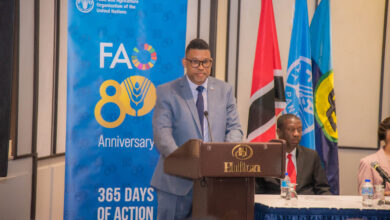I bring you greetings from the management and staff of the Caribbean Development Bank and convey the President’s best wishes for a very successful Forum and associated side meetings.
Prior to the onset of the ongoing economic downturn referred to in some quarters as the “Great Recession,” the international community through a series of fora that started with the 2002 International Conference on Financing for Development in Monterrey, Mexico, to the Third High Level Forum on Aid Effectiveness in Accra in 2008, undertook a number of actions that made the issue of efficient management for development results (MfDR) a global imperative.
In keeping with this, and the consequential tightening of fiscal space that the Great Recession imposed on both the Borrowing and Non-Borrowing Member Countries of the Bank, MfDR increasingly became an important framework for the Bank’s management. This meant that among other things, the Bank had to go beyond the traditional focus on inputs and outputs of its-funded interventions and to pay greater attention on the achievement of outcomes—that is, more explicit consideration of the contribution that these interventions make to real improvements in people’s lives.
This results-focused agenda which is closely tied to the Millennium Development Goals (MDGs), is consistent with the Bank’s primary development focus to assist its Borrowing Member Countries achieve sustainable results in reducing poverty and building resilience to external shocks. Hence, as part of its current Strategic Plan, the Bank uses the Caribbean Specific MDG indicators and targets, developed in conjunction with the CARICOM Secretariat and UNDP, to monitor progress on these development outcomes. BMCs’ performance in achieving development outcomes related to poverty reduction and human development, economic growth, environmental sustainability and climate change also inform the Bank’s country assistance strategies and programmes.
It is very important therefore, when BMC’s vulnerabilities as small island developing states (SIDS), including their small, open economies; high levels of poverty and unemployment particularly among youth; and vulnerability to natural hazards and climate change impacts are considered, for BMCs to make the development of both their capability and capacity to collect, analyze and report on indicators associated with these and other development outcomes a national priority. This means that among other things, the National Statistical Systems would need to acquire both the capability and capacity to produce timely, relevant and high quality statistics as inputs into policies for sustained economic growth and development. The demand for such inputs is urgent now and is expected to increase as part of the post-2015 development agenda.
The Report of the High-Level Panel of Eminent Persons on the Post-2015 Development Agenda set up by the UN Secretary General, calls for “…a data revolution for sustainable development, with a new international initiative to improve the quality of statistics and information available to citizens…” For countries in the Region, this data revolution will require among other things, intensified efforts to address some of the critical deficiencies that still exist in the various National Statistical Systems. While the processes supporting the collection and analysis of basic, economic statistics have improved over the years, many countries, despite substantial investments in the last two decades by the Bank and other development organisations, the monitoring of the MDG indicators and evidence-based policy formulation continue to be impeded by significant challenges related to the collection, analysis and dissemination of economic, social, environmental and human development data. Lessons from both the regional and national levels indicate that poor monitoring and reporting of development performance will not improve without specific and targeted intervention at the level of data gathering, analysis and warehousing.
In this regard, the conclusion of Expert Group Meeting on Small Island Developing States and the Post-2015 Agenda (April 23-24, 2013) that [and I quote] “monitoring and evaluation (M&E) systems are a cornerstone of development progress, and for the systems to be effective, they must be based on strong and accurate data” [unquote] aptly reflects the value of statistics to the development of our Region. The meeting’s report continues that [and I quote] “With a solid data foundation, monitoring and evaluation systems can promote accountability and policy coherence. And with credible data and monitoring systems, alternatives to GDP as a basis for classifying countries will gain traction.” It recommended therefore that [and I quote] “The capacity of SIDS to gather and analyse data should be strengthened, with an eye to bolstering knowledge management systems and M&E frameworks.”
CDB recognises the value of this Forum in obtaining strengthened high-level commitment by governments of CARICOM to national and regional statistical capacity-building as a central element of the Region’s Post-2015 sustainable development framework. Along with other development partners viz. CIDA, DFID and UNDP, the Bank has contributed over USD6.0 mn since 1995 to assist countries with the conduct of Country Poverty Assessments, which in addition to providing statistics on the nature and characteristics of poverty in the countries, have also resulted in the production of rich national data sets on human and social development for the first time, central statistics offices better equipped and a cadre of persons with skills at various levels in conducting household research. Similar investments have been made over the years in enhancing national trade, economic and environmental data, but there is still some ways to go….
Therefore the Bank is committed to continue supporting its BMCs in those areas and in addressing the specific human development measurement issues to be discussed at these meeting i.e. the availability of reliable employment data and labour market information; multi-dimensional poverty measurement; and Census data analysis. It hopes that the deliberations over the next three days will advance beyond discussions and result in firm commitments and the requisite actions subsequently – by the National Governments, ourselves and the other participating development partners – to bring about some real improvements in statistical capacity in the Region; improvements that will enhance NSSs’ capabilities to respond to the data demands presented by the Region’s current development imperatives and the anticipated challenges in the Post-2015 era.
Thank You






